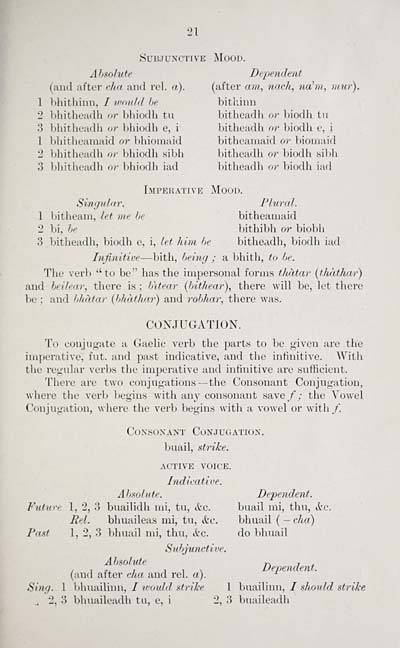Download files
Complete book:
Individual page:
Thumbnail gallery: Grid view | List view

21
SuiuL'NCTivK Mood.
A Iixofvfc Depend tilt
(ami after cIki and vol. a). (aftor atn, n<ich, na'h/, inur).
1 bhitllilUl, / irniihl he bitl'.illll
2 bliitlic-adh <>r lihiodh tu hitheadli m- bindh tu
•.\ l)liitliL"adli nr hhiodli e, i l)itlic'adh <,r hiodh v, i
1 liliitliL'amaid or lihioiuaid Ititlicamaid or bioniaid
2 bliitlu'adli or i.hiodh sihli bitheadh or biodh sibli
;5 blutlu'adli or liliiodli iad bitheadh or biodh iad
Imperative Mood.
Sin(/ii/iir. I'/taa/.
1 bitheam, let rn<- he bitheauiaid
2 bi, he bithibh or biobh
3 bitheadli, biodli e, i, let him he bitheadh, biodli iad
Infinitive — bith, being ; a bhith, to he.
The verb "to be" has the impersonal forms tluitar (fhafhar)
and beilear, there is ; hitear (hithear), there will be, let tbere
be ; and hhàtar {hhhthar) and i-obhar, there was.
CONJUGATION.
To conjugate a Gaelic verb the parts to be given are the
imperative, fut. and past indicative, and the infinitive. With
tlie regular verbs the imperative and infinitive are sufficient.
There are two conjugations— the Consonant Conjugation,
where the verb begins with any consonant save/; the Vowel
Conjugation, where the verb begins with a vowel or with/.
Cu-NSUXANT CONJUUATIOX.
buail, strike.
ACTIVE VOICE.
Indi<<itire.
A imolntc. Dependent.
Fufuri- 1, 2, 3 buailidh mi, tu, kn. buail mi, thu, kf.
Kel. bhuaileas mi, tu, t'irc. bhuail ( - eha)
Past 1, 2, 3 bhuail mi, thu, &i:. do 1)huail
Sidjijunctive.
Ahso/i(te j^ J ^
, 1 i. , 1 1 \ Dependent.
(and after rhtt and rel. «)•
Si)ie/. 1 bliuailinn, / ?''o?</c7 .s'/r//.r I \)nixi\hn\, I .^thould strike
.. '2, 3 bhuaileadh tu, e, i 2, 3 buaileadh
SuiuL'NCTivK Mood.
A Iixofvfc Depend tilt
(ami after cIki and vol. a). (aftor atn, n<ich, na'h/, inur).
1 bhitllilUl, / irniihl he bitl'.illll
2 bliitlic-adh <>r lihiodh tu hitheadli m- bindh tu
•.\ l)liitliL"adli nr hhiodli e, i l)itlic'adh <,r hiodh v, i
1 liliitliL'amaid or lihioiuaid Ititlicamaid or bioniaid
2 bliitlu'adli or i.hiodh sihli bitheadh or biodh sibli
;5 blutlu'adli or liliiodli iad bitheadh or biodh iad
Imperative Mood.
Sin(/ii/iir. I'/taa/.
1 bitheam, let rn<- he bitheauiaid
2 bi, he bithibh or biobh
3 bitheadli, biodli e, i, let him he bitheadh, biodli iad
Infinitive — bith, being ; a bhith, to he.
The verb "to be" has the impersonal forms tluitar (fhafhar)
and beilear, there is ; hitear (hithear), there will be, let tbere
be ; and hhàtar {hhhthar) and i-obhar, there was.
CONJUGATION.
To conjugate a Gaelic verb the parts to be given are the
imperative, fut. and past indicative, and the infinitive. With
tlie regular verbs the imperative and infinitive are sufficient.
There are two conjugations— the Consonant Conjugation,
where the verb begins with any consonant save/; the Vowel
Conjugation, where the verb begins with a vowel or with/.
Cu-NSUXANT CONJUUATIOX.
buail, strike.
ACTIVE VOICE.
Indi<<itire.
A imolntc. Dependent.
Fufuri- 1, 2, 3 buailidh mi, tu, kn. buail mi, thu, kf.
Kel. bhuaileas mi, tu, t'irc. bhuail ( - eha)
Past 1, 2, 3 bhuail mi, thu, &i:. do 1)huail
Sidjijunctive.
Ahso/i(te j^ J ^
, 1 i. , 1 1 \ Dependent.
(and after rhtt and rel. «)•
Si)ie/. 1 bliuailinn, / ?''o?</c7 .s'/r//.r I \)nixi\hn\, I .^thould strike
.. '2, 3 bhuaileadh tu, e, i 2, 3 buaileadh
Set display mode to: Large image | Transcription
Images and transcriptions on this page, including medium image downloads, may be used under the Creative Commons Attribution 4.0 International Licence unless otherwise stated. ![]()
| Early Gaelic Book Collections > Hew Morrison Collection > How to learn Gaelic > (33) |
|---|
| Permanent URL | https://digital.nls.uk/79790535 |
|---|
| Description | A selection of items from a collection of 320 volumes and 30 pamphlets of literary and religious works in Scottish Gaelic. From the personal library of Hew Morrison, the first City Librarian of Edinburgh. |
|---|
| Description | Selected items from five 'Special and Named Printed Collections'. Includes books in Gaelic and other Celtic languages, works about the Gaels, their languages, literature, culture and history. |
|---|

